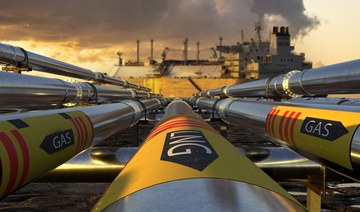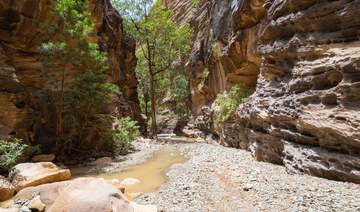MANILA: While Philippine tycoons argue over a typing error in a highway bid and whose shopping mall benefits the most from a train station, commuters are paying the price.
A 47-km expressway connecting Manila to the southern provinces has been delayed by a San Miguel Corp. appeal to President Benigno Aquino after its bid was rejected on a technicality.
Meanwhile, SM Prime Holdings, the group of billionaire Henry Sy, and Ayala Land are fighting over where to build a train station, both seeking to place it closer to their respective malls 600 meters from each other.
Caught in the middle are 22.7 million people who live and work in metro Manila, where inadequate infrastructure and recurring flooding produce gridlock and stunt the economy.
The project delays threaten Aquino's plan to lure $11.6 billion of investment in roads, railways and airports to spur growth to as much as 8.5 percent by the time he leaves office in 2016.
"It is frustrating how delays in major infrastructure arise from conflicts between those who wield economic or legal power," commuter Aneka Rodriguez, 31, said.
A court injunction on the train station means further delays to projects that may cut her daily commute by five hours, she said.
The Philippine economy is dominated by business groups run by a handful of politically connected families.
The Zobel family owns half of 180-year-old Ayala Corp., which transformed a former airstrip in Makati City into the nation's Wall Street and has a market value of $9 billion. The Zobels supported Corazon Aquino, the former president and Benigno's mother.
Sy, 90, is the nation's richest man with a net worth of $11.6 billion, according to the Bloomberg Billionaires Index. He built his empire from a shoe business and now owns the nation's biggest bank and mall operator. SM Prime has also locked horns with Ayala Land over reclamation projects in Manila Bay.
San Miguel, the nation's biggest company and maker of the 116-year-old beer brand, is run by Ramon Ang and its chairman, Eduardo Cojuangco, is an uncle of the nation's president.
The key to cutting Rodriguez's commute is the planned station where Light Rail Transit 1, Metro Rail Transit 3 and Metro Rail Transit 7 intersect, which is in limbo as SM Prime and Ayala fight over the location.
The argument stems from a contract SM Prime signed in 2009 putting the station in front of its mall, while an Ayala-led venture won a government contract to extend LRT-1 last month that effectively allowed it to build the station near its own mall. San Miguel, which is building MRT-7, supports SM Prime.
The delays frustrate about 1.1 million commuters who use LRT-1 and MRT-3 daily. The MRT-7 line, first proposed in 2002, has an estimated capacity of 450,000 travelers.
Corazon Guidote, SM's head of investor relations, said the common station case is separate from other contracts and the company "does not include, nor intend to delay all other infrastructure projects."
The $790 million Cavite-Laguna Expressway, or Calax, is also stalled after a 20.1 billion-peso ($449 million) bid by San Miguel in June was rejected because of an incorrectly dated credit letter, leaving an Ayala venture as the winner with a bid of 11.7 billion pesos.
"This huge undertaking will have a big impact on the country for many years to come and we believe government should have the best options available," San Miguel said in a statement on Oct. 22.
Ayala has asked President Aquino to award the project to either San Miguel or its venture, Ayala Managing Director Eric Francia said in an e-mail reply to questions. He said Ayala won't go to court if San Miguel gets the project to avoid further delays.
Court cases and appeals to the president's office "delay the process and can be frustrating to investors," Francia said.
"The possibility of a rebid in the case of Calax yet threatens further delay."
The discrepancy led President Aquino to signal last week that the bidding process might be repeated, potentially leading to further legal challenges and delays in the project.
Aquino has said that accepting a lower bid while there is a higher offer is a public issue.
"We have to protect the people's interest," he said.
Ayala Corp. fell 0.3 percent as of the noon break in Manila, lagging a 0.3 percent gain for the benchmark Philippine stock index. SM Prime rose 3.6 percent, while San Miguel slipped 0.3 percent.
To get to grips with delays caused by legal challenges, a proposed law pending in Congress calls for companies to be fined 0.5 percent of a project's cost if they make an appeal to the government after bids are submitted, said Cosette Canilao, executive director at the Public-Private Partnership Center. An appeal costs about $40 now, she said.
"The Philippine economy can grow even faster if infrastructure logjams were cleared," said Gundy Cahyadi, a Singapore-based economist at DBS Group Holdings Ltd.
"If infrastructure development goes full steam that would mean higher capacity, improved production and lower cost for industries."
While the Philippine economy is projected to be among the world's five fastest-growing until 2016, it ranks 96th in infrastructure in the World Economic Forum's 2013 Global Competitiveness report, the lowest among major Southeast Asian nations.
The Philippines attracted a record $4 billion in foreign direct investment in 2013, yet it drew the least among major Southeast Asian economies, according to the UN Conference on Trade and Development.
"Material delays in project implementation could incur concerns on regulatory consistency and transparency, which are important for sustainable, long-term interest from private- sector investors," said Mic Kang, a Hong Kong-based infrastructure analyst at Moody's.
Not all projects are delayed.
About 80 percent of 15,000 classrooms being built in a PPP venture are done, while Ayala's 4-kilometer toll road south of Manila is 50 percent complete.
The government is moving "in the right direction," said Richard Bolt, the country director at Asian Development Bank. "Reforms don't happen overnight."
For commuters like Rodriguez, they can't happen soon enough.
The legal associate rented a $300-a-month apartment with friends to be closer to her office in Makati and goes to her family home 34 kilometers away only on weekends.
"I chose to move around this problem," she said, noting that not everyone in the nation has that ability.
Feuding tycoons stunt Philippine infrastructure
Feuding tycoons stunt Philippine infrastructure

ADNOC to boost production target by 2030

RIYADH: The Abu Dhabi National Oil Co. plans to boost its local manufacturing target for critical industrial products to 90 billion dirhams ($24.5 billion) by 2030 in a bid to strengthen the UAE’s industrial sector and expand local manufacturing capabilities.
ADNOC made the announcement at the “Make it in the Emirates” forum, adding that the new target is part of its expanded In-Country Value program, which aims to drive an additional 178 billion dirhams back into the UAE economy by 2028.
“This expanded initiative will support the UAE’s economic diversification, attract local and international investors, and provide high-skilled private sector jobs for UAE nationals. Additionally, it will stimulate entrepreneurial growth and drive sustainability in ADNOC’s supply chain,” said Sultan Ahmed Al-Jaber, minister of industry and advanced technology, and ADNOC managing director and group CEO.

This expanded initiative will support the UAE’s economic diversification, attract local and international investors.
Sultan Ahmed Al-Jaber, UAE minister of industry and advanced technology
The company said its previous 2027 target of 70 billion dirhams worth of products was “delivered ahead of schedule” following the award of two contracts for metal pipes and valves worth 16.8 billion dirhams to local manufacturers.
The contracts include 8.8 billion dirhams for metal pipes to PM Piping Petroleum Equipment, Ajmal Steel, and the Emirati-owned Al Gharbia Pipe Co.; and 8 billion dirhams for mechanical valves to Samamat, Camtech Manufacturing, Tisco Valves Manufacturing, PTPA, MT Valves and Industries.
ADNOC’s expanded ICV program also aims to provide a micro, small and medium enterprises accelerator program to enable Emirati businesses and local mSMEs to conduct business across ADNOC’s supply chain.
Saudi Arabia’s Sports Boulevard doubles its existing investment fund to $533m
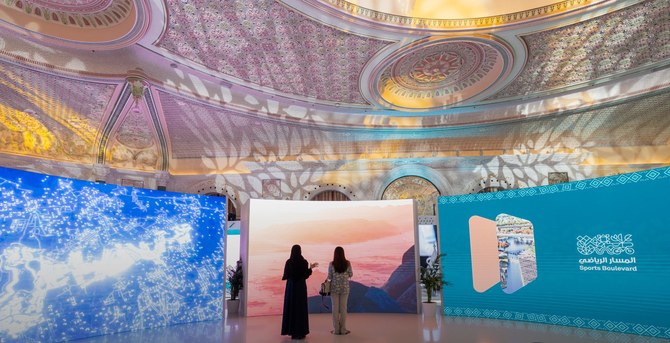
RIYADH: Private sector participation in the Sports Boulevard project is set to increase as the foundation behind Riyadh’s largest linear park plans to double its investment fund to SR2 billion ($533 million).
In a press release, the Sports Boulevard Foundation announced its partnership with Ajdan Real Estate Development Co. and Albilad Capital to add an additional SR1 billion to the private real estate investment fund “Sports Boulevard Real Estate Fund 1.”
This increased funding will be utilized to bolster private sector participation within the Arts District, one of the destinations within the Sports Boulevard project.
The Sports Boulevard Development Co. will continue to hold the majority of units in the fund, while Ajdan Real Estate Development Co. will serve as a developer and primary investor, and Albilad Capital will act as the fund manager.
This partnership underscores the collaborative effort behind the expansion, signifying a strategic alliance aimed at creating a vibrant urban space that enhances Riyadh’s cultural and economic landscape.
The project aims to develop a mixed-use lifestyle destination consisting of residential, retail, office, and entertainment components.
Covering a land area of over 39,000 sq. m. at the heart of the Arts District, the total combined built-up site spans approximately 240,000 sq. m., boasting over 100,000 sq. m. of net leasable area.
The design of this destination draws inspiration from the Sports Boulevard Design Code, influenced by the Salmani Architectural Style. This ensures a dynamic and immersive lifestyle experience for both residents and visitors.
Situated at the intersection of Prince Mohammed bin Salman bin Abdulaziz Road and Prince Turki bin Abdulaziz Al Awwal Road, it offers expansive public spaces, recreational areas, and cycling-friendly tracks.
Covering an area of 184,000 sq. m., the project extends beyond private development parcels, providing ample space for recreational activities and pedestrian-friendly pathways, efficiently linked to the promenade and cycling bridge.
Sports Boulevard, a mega project launched by King Salman bin Abdulaziz in 2019, and supported by Crown Prince Mohammed bin Salman bin Abdulaziz, spans over 135 km on Prince Mohammed bin Salman bin Abdulaziz Road.
It features safe green pathways for pedestrians, cyclists, athletes, and horse riders, connecting Wadi Hanifah in the west to Wadi Al Sulai in the east.
Additionally, the project includes over 4.4 million sq. m. of greenery, open spaces, and up to 50 multidisciplinary sports facilities. It also hosts several unique destinations and investment zones, totaling an area exceeding 3 million sq. m.
Closing Bell: Saudi benchmark index edges down to close at 11,831
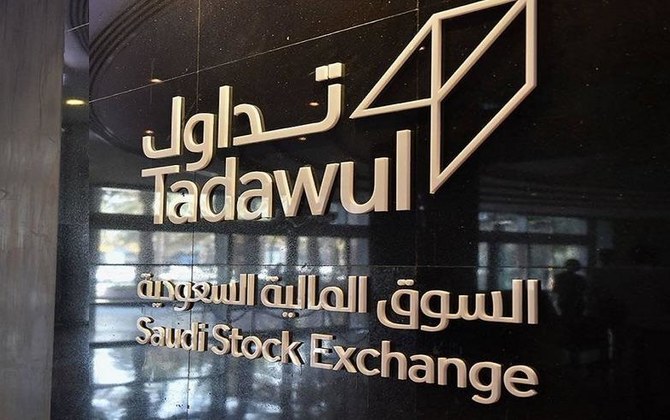
RIYADH: Saudi Arabia’s Tadawul All Share Index slipped on Monday, losing 19.42 points, or 0.16 percent, to close at 11,831.22.
The total trading turnover of the benchmark index was SR5.8 billion ($1.5 billion) as 110 stocks advanced, while 108 retreated.
On the other hand, the Kingdom’s parallel market Nomu also slipped 189.65 points, or 0.71 percent, to close at 26,448.54. This comes as 30 stocks advanced while as many as 34 retreated.
Similarly, the MSCI Tadawul Index also dropped 2.67 points, or 0.18 percent, to close at 1,470.41.
The best-performing stock of the day was Saudi Paper Manufacturing Co. The company’s share price surged 4.89 percent to SR75.10.
Other top performers included CHUBB Arabia Cooperative Insurance Co. as well as Middle East Specialized Cables Co., whose share prices soared by 3.96 percent and 3.46 percent, to stand at SR34.10 and SR32.85 respectively.
On Nomu, Osool and Bakheet Investment Co. was the top gainer, with its share price rising by 9.22 percent to SR48.
Other best performers on Nomu were View United Real Estate Development Co. as well as Al-Modawat Specialized Medical Co., whose share prices soared by 6.53 percent and 6.20 percent to stand at SR79.90 and SR150.80, respectively.
Additional top gainers included Almujtama Alraida Medical Co. and Bena Steel Industries Co.
On the announcement front, Saudi Basic Industries Corp., known as SABIC, received all necessary approvals from relevant authorities to complete the acquisition of its subsidiary Saudi Iron and Steel Co., also known as HADEED, by the Public Investment Fund.
In a statement on Tadawul, SABIC announced that it has satisfied all transaction-related conditions to complete the SR12.5 billion acquisition announced earlier in September 2023.
Furthermore, Saudi Arabia aluminum producer Al Taiseer Group Talco Industrial Co. is listing a 30 percent stake on the Tadawul stock exchange following an initial public offering, setting the final offer price at SR43 per share.
The company is selling 12 million shares and has completed the book-building process for institutional investors, which saw a coverage of 68.5 times the total offer shares, according to Alinma Investment Co., the lead manager and financial adviser to the issuance.
The book-building process for retail investors will run for two days starting on May 28. During this time, they can subscribe to a maximum of 10 percent of the shares. The final share allocation is set for June 2.
Saudi Arabia focused on promoting energy efficiency: top official
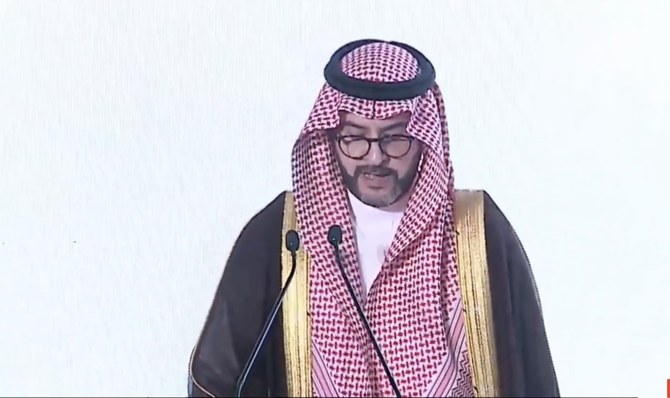
RIYADH: Saudi Arabia’s budding energy efficiency sector has witnessed notable growth, with the number of licensed service providers reaching 55 by the end of 2023, says a top official.
As the Kingdom strives to reduce its carbon footprint, with recently amplified goals to achieve net-zero by 2060, the Saudi Energy Efficiency Center is working to aide the nation in realizing these ambitions, Nasser Al-Ghamdi, the CEO of the center noted.
In his inaugural address at the Saudi ESCO forum, the top executive stressed the entity’s role in raising awareness about energy efficiency. He highlighted that 26 universities nationwide have adopted energy efficiency topics and courses in their curricula.
“Since the inception of the center, we have launched various initiatives that will help in reducing energy consumption,” Al- Ghamdi said.
Among these undertakings, the body has succeeded in launching and implementing more than 200 training programs in the field of energy efficiency, the CEO added.
The executive emphasized that the center has strived to create the necessary ecosystem for suppliers and their beneficiaries in this “promising market” to ensure the quality of energy-efficiency service providers.
He added that this will be achieved through the application of a licensing system for those interested in investing in this field after meeting the technical requirements necessary to provide the service.
Highlighting the role that the fledgling sector is playing in achieving net-zero goals, the CEO said: “The sector, which is considered relatively new, is helping companies and enterprises and buildings in finding solutions to efficiently use energy, including financing and managing solutions and projects. These companies also contribute energy consumption analysis and knowing opportunities for companies to improve their consumption.”
Due to the absence of energy efficiency activities in the commercial sector, one of the highest energy consumers in the Kingdom, accounting for 15.7 percent of total consumption of facilities in the nation, the body launched a pilot project to improve this field.
The initiative aims to improve conditions in the commercial sector by raising business owners’ awareness of opportunities, as implementing energy auditing projects is expected to improve overall efficiency.
Yanbu Royal Commission teams up with Skytower Investments for industrial projects development
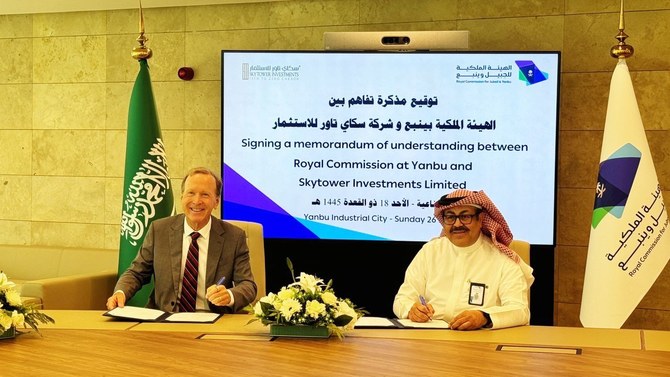
RIYADH: Saudi Arabia’s Yanbu governorate is poised to see the development of several industrial projects following an agreement between its Royal Commission and Skytower Investments Ltd.
The memorandum of understanding, signed by the commission’s CEO, Abdul Hadi Al-Juhani, aims to develop industries in the petrochemicals sector, specialized chemicals, renewable energy, and other manufacturing divisions.
This MoU signing is part of the Royal Commission’s ongoing efforts to attract more local and international investments to Yanbu Industrial City in promising sectors, aligning with the objectives of Saudi Vision 2030 programs.
Headquartered in Riyadh, STI is an investment firm specializing in renewable technology, green manufacturing, supply chain, and green power production.
“This is a result of significant development over the past nine months by both teams paving the way for more international manufacturing and localization projects landing in Yanbu,” Skytower said in a tweet on X.
It added: “This agreement will pave the way for more international manufacturing and localization projects landing in Yanbu, an industrial heartland with complete industry infrastructure and extensive manufacturing experiences.”
In April, STI signed a four-party joint agreement with Chinese automaker Chery Automobile Co., the Ministry of Investment, and the National Industrial Development Center.
This collaboration, driven by Saudi Arabia’s Vision 2030, signifies a crucial step toward future economic opportunities and the well-being of the Saudi people.
In August 2023, the Kingdom’s untapped southern region took a significant step toward welcoming international travelers.
Cruise Saudi and the Royal Commission for Jubail and Yanbu signed an MoU to unlock the region’s tourism potential. This strategic partnership was aimed at positioning the southern region as a captivating tourist destination, fostering growth in the travel sector and contributing to the region’s economic advancement.
Formalized during the MASAREB ceremony held in Jazan, the agreement encompassed a spectrum of efforts, from knowledge transfer to mutual alignment on ventures aimed at establishing the destination and yielding a positive local impact.
STI is a global partnership between NGOs, green businesses with advanced eco-friendly technology, sustainable manufacturing, and Saudi’s national sustainable economic development authorities.
Their aim is to develop practical plans for industry decarbonization, economic revitalization, technological advancement, and carbon-neutral technology.


